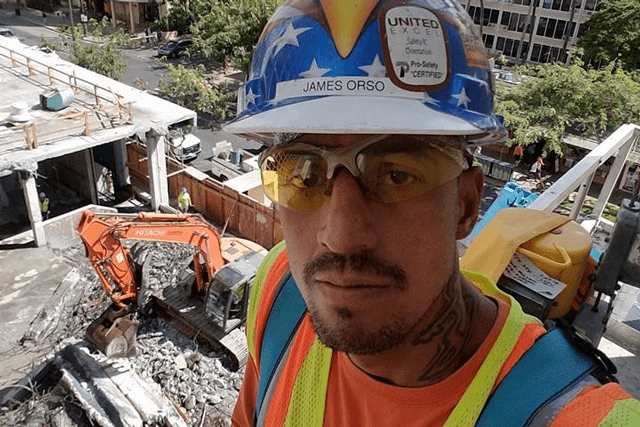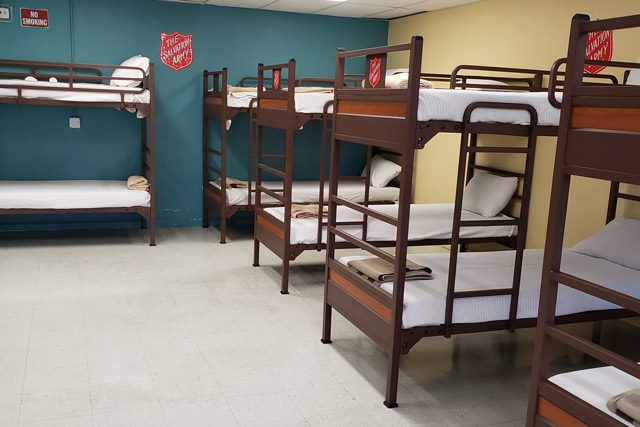Listen to this article
Listen to this article
Loading
Play
Pause
Options
0:00
-:--
1x
Playback Speed- 0.5
- 0.6
- 0.7
- 0.8
- 0.9
- 1
- 1.1
- 1.2
- 1.3
- 1.5
- 2
Audio Language
- English
- French
- German
- Italian
- Spanish
Open text
deaf patron gets timely boost from the salvation army. by jared mckiernan – it was the end of the job interview, and jerome cain felt good news coming. he nailed it. a shoe-in, he thought. then, he got a message back from the hiring manager. “due to safety concerns and you not being able to hear fire alarms or [instruction] in an active shooter situation, we cannot hire you at this time. i am very sorry, because i think you would make a wonderful addition to the team.” “can you imagine that?” said cain, born entirely deaf. “can you imagine if they have a deaf customer and they have an active shooter—does that mean they can’t let deaf customers into the store?” according to the institute on disability at the university of new hampshire, the 2015 unemployment rate for working-age adults with hearing disabilities living in the u.s., sat at a whopping 49 percent. that’s roughly every other person—and more than 10 times the current national unemployment rate. cain said it’s not the first time he felt he was discriminated against, solely for his “disability”—which, if you ask him, is no disability at all. “i think sometimes deaf people are automatically perceived as lazy or as less intelligent—as if they cannot analyze, think freely,” cain said through a translator. “many even imagine that deaf people cannot work or drive. that’s not from everyone, obviously, but a heavy stigma is placed on deaf people.” though hearing impairment poses a unique set of challenges, cain doesn’t let it stop him. growing up, he spent time in oklahoma, arizona and texas, before moving on to teach sign language and interpret for gallaudet university and in courthouses. in addition to american sign language (asl), cain fluently speaks swedish sign language, french sign language and russian sign language. after a stint working overseas, cain recently returned home to phoenix, arizona, and found himself short on cash. he needed a place to live, but he didn’t want to burden any friends, so he googled some resources to help with a security deposit. his top hit: the local salvation army. cain walked in and explained his conundrum. since no staff member at the salvation army could fluently speak asl, the caseworker paired with cain had to communicate with him by passing notes back and forth. throughout the process—from discussing his needs, to submitting his bank statements, and coordinating with the financial team—he couldn’t believe how accommodating the staff was. “they were extremely patient with me,” he said. “it somehow worked, and we understood each other. i really appreciated how they tried hard to make sure we communicated well.” with the money for a security deposit, cain locked up an apartment and even secured employment with a local warehouse shortly thereafter. “i feel like it’s my obligation to let the deaf community know about the salvation army and how they helped me,” he said. “they don’t discriminate on religion and gender and disability…i think some deaf people view the salvation army as something negative and not deaf-friendly. but when i needed help, they helped me out.”.
Open context player
Close context player
Plays:-Audio plays count
deaf patron gets timely boost from the salvation army. by jared mckiernan – it was the end of the job interview, and jerome cain felt good news coming. he nailed it. a shoe-in, he thought. then, he got a message back from the hiring manager. “due to safety concerns and you not being able to hear fire alarms or [instruction] in an active shooter situation, we cannot hire you at this time. i am very sorry, because i think you would make a wonderful addition to the team.” “can you imagine that?” said cain, born entirely deaf. “can you imagine if they have a deaf customer and they have an active shooter—does that mean they can’t let deaf customers into the store?” according to the institute on disability at the university of new hampshire, the 2015 unemployment rate for working-age adults with hearing disabilities living in the u.s., sat at a whopping 49 percent. that’s roughly every other person—and more than 10 times the current national unemployment rate. cain said it’s not the first time he felt he was discriminated against, solely for his “disability”—which, if you ask him, is no disability at all. “i think sometimes deaf people are automatically perceived as lazy or as less intelligent—as if they cannot analyze, think freely,” cain said through a translator. “many even imagine that deaf people cannot work or drive. that’s not from everyone, obviously, but a heavy stigma is placed on deaf people.” though hearing impairment poses a unique set of challenges, cain doesn’t let it stop him. growing up, he spent time in oklahoma, arizona and texas, before moving on to teach sign language and interpret for gallaudet university and in courthouses. in addition to american sign language (asl), cain fluently speaks swedish sign language, french sign language and russian sign language. after a stint working overseas, cain recently returned home to phoenix, arizona, and found himself short on cash. he needed a place to live, but he didn’t want to burden any friends, so he googled some resources to help with a security deposit. his top hit: the local salvation army. cain walked in and explained his conundrum. since no staff member at the salvation army could fluently speak asl, the caseworker paired with cain had to communicate with him by passing notes back and forth. throughout the process—from discussing his needs, to submitting his bank statements, and coordinating with the financial team—he couldn’t believe how accommodating the staff was. “they were extremely patient with me,” he said. “it somehow worked, and we understood each other. i really appreciated how they tried hard to make sure we communicated well.” with the money for a security deposit, cain locked up an apartment and even secured employment with a local warehouse shortly thereafter. “i feel like it’s my obligation to let the deaf community know about the salvation army and how they helped me,” he said. “they don’t discriminate on religion and gender and disability…i think some deaf people view the salvation army as something negative and not deaf-friendly. but when i needed help, they helped me out.”.
Listen to this article














